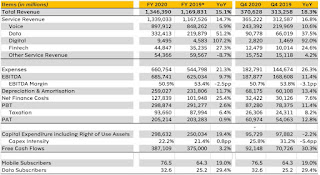MTN Nigeria Ends 2020 With 76.5M Subscribers; Data Revenue Rises To ₦332.37B
MTN Nigeria Communications Plc (MTN Nigeria) announces its audited for the financial year ended 31 December 2020. MTN Nigeria’s mobile subscriber base grew 19% year-on-year and stood at 76.5 million with active data users increased by 7.4 million to 32.6 million (up by 29.4%).
In the year, according to the financial statements of the firm released to the Nigerian Stock Exchange (NSE) and analysed by Brand Spur, the sum of N1.346 trillion was generated in the year, higher than the N1.169 trillion achieved in 2019, an increase of 15.1%.
MTN Nigeria's profit after tax grew 0.9% to N205 billion while the Profit before tax (PBT) also grew by 2.6% to N298.9 billion.
Key metrics:
- Mobile subscribers increased by 12.2 million to 76.5 million
- Active data users increased by 7.4 million to 32.6 million
- e-Service revenue increased by 14.7% to NGN1.3 trillion
- Earnings before interest, tax, depreciation, and amortisation (EBITDA) grew by 9.7% to N685.7 billion
- Net Assets N178.3b +22:3%
- Market Cap - N3.4 trillion +61.8%
- EBITDA margin declined by 2.5 percentage points (pp) to 50.9%
- Earnings per share (EPS) rose by 0.9% to N10.1
- A proposed final dividend of N5.90 kobo per share (Total including interim N9.4).
Unless otherwise stated, financial and non-financial information is year-on-year (YoY, full-year 2020 versus 2019)
MTN Nigeria CEO, Ferdi Moolman comments:
"2020 was a challenging year for all The unprecedented disruption that the COVID-19 pandemic caused the businesses and people we serve, challenged us in new and demanding ways.
The impact continuss to evotve. Adoption of our data and digital services accelerated as lockdowns and gathering restrictions were imposed and work-from-home became the norm for many.
Our thoughts and prayers are with those who have lost loved ones due to the pandemic the toll on lives and livelihoods globally have been profound. To date, Nigeria has recorded 155,417 confirmed COVID-19 cases and 1,905 related deaths, according to the Nigeria Centre for Disease Control (NCDC). MTN Nigeria has also been directly
impacted by the pandemic, with 62 employees diagnosed with COVID-19 and 46 recoveries. Sadly, one of our employees succumbed fo the virus.
Our employees adapted quickly to working remotely to ensure that our customers remained connected. I am incredibly proud that we were able to meet the challenges faced in 2020, by pulling together, working closely with the government and our regulators, and understanding our customers evolving needs.
As we navigated the fallout of the pandemic, adopting our processes and structures to the new realities, we acted swiftly to support the national response ina holistic way. This was encapsulated in our Y'ello Hope Initiatives through which we provided support to our broad base of stakeholders to the value of approximately N25 billion
We provided free-to-access services (including SMS and data) to the most vulnerable, supported the acquisition of essential medical supplies (tests and personal protective equipment), and joined the Coalition Against COVID-19 CACOVID) that drove multiple initiatives, including building isolation centres across the country.
We also paid our taxes early in support of the government's ongoing efforts. In January 2021, MTN Group partnered with the African Union contributing US$25 million to their COVID-19 vaccination programme. MTN Nigeria Is pleased to play its part in this initiative, through which Nigeria will receive 1.4 million vaccine doses for the benefit of health workers.
in addition, we committed marketing resources to our #WearltForMe campaign to help create awareness around wearing masks, and our REVV support programme for Micro, Small and Medium Enterprises (MSME) helped them navigate the new digital reality.
Our performance demonstrated strong operational execution and resilience in our business. We connected 12.2 million new customers to our network bringing our total subscriptions to 76.5 million.
The introduction of additional customer registration requirements and suspension of the sale and activation of new SIMs towards the end of the year affected subscriber growth. We remain committed to ensuring our subscriber records are updated with the National identity Number (NIN) and continue working closely with the government, supporting their efforts by expanding capacity to provide NIN enrolment services across our customer interaction touchpoints.
Active data users increased by 7.4 million to 32.6 million, supported by growth In gross connections and the expansion of our4G network. Our mobile money (MoMo) business also continued to accelerate with @ 269.2% increase in my number of registered agents to over 395,000 and 4.7 million active subscribers from approximately 553,000 in 2019.
Service revenue grew by 14.7% in line with our medium-term targets, driven mainly by voice and data revenue. Voice revenue grow was 5.9% and although this was subdued in G2 due to COVID-19 induced restrictions, we saw a pickup in momentum into Data revenue rose by 51.2%, with increased data usage and traffic.
To accommodate this and enhance service quality, we focused on capacity upgrades and 4G population coverage, while expanding our investments in rural connectivity. Our 4G network now covers 60.1% of the population, up from 43.8% in 2019.
EBITDA rose by 9.7%, supported by service revenue growth. However, the EBITDA margin declined by 2.5pp fo 50.9%. This was mainly due to increased operating expenses, arising from the new rollout of new sites and the impact of Naira depreciation, affecting, in particular, the costs of our lease contracts.
Despite the increase in costs, we recorded an improvement in our bottom-line earnings, with profit before tax PBT) and profit after tax (PAT) increasing by 2.6% and 0.9% respectively.
In line with our dividend policy, the board has proposed a final dividend of N5.90 kobo per share to be paid out of distributable net income. This brings the total dividend for the year to N9.40 kobo per share, representing an increase of 18.7%.
I thank the Boord, Management, and staff of MTN Nigeria for the supports given to me and the opportunity to serve in Nigerian as I complete my tenure as CEO of MTN Nigeria and assume a new role as MTN Group Chief Risk Officer. Effective 1 March 2021, Karl Toriola will take over as the CEO. I wish Karl and his new team the very best."
Operational review
We made considerable progress in growing the base for our business, connecting 12.2 million new subscribers to access communication services, The growth in our subscriber base provided support for voice revenue, which accounted for 67.1% of service revenue and rose by 5.9% with an acceleration in growth to 8.9% YoY in H2, This was enabled by our expanded customer acquisition touchpoints, rural telephony initiatives and revamped acquisition offers.
The suspension of new SIM registration in mid-December did not have a significant impact on voice revenue as we saw an increased level of activity from the existing base.
Data revenue maintained the positive momentum from Q2, prompted by the COVIO19 lockdown, rising by 51.2%. The performance in data was led by a combination of increased subscribers, usage (MB per user) and ultimately traffic, supported by increased network capacity and 4G penetration.
Data traffic rose by 126.86 and average usage by 64.0%. We added approximately 8.2 million new smartphones to the network bringing smartphone penetration to 45.9% of our base, up from 41.9% in 2019.
Fintech revenue rose by 27.3%, boosted by MTN Xtratime, our airtime lending service. We expanded our MoMo agent network with the addition of over 280,000 registered agents during the year.
This was achieved os we continued to convert our traditional airtime agents in line with our one distribution model. Our fintech subscribers increased by more than eight times to 4.7 million, driving higher transaction volumes of over 51.5 million during the year and core fintech revenue growth of 28.0%.
The uptake of our digital business continued to gain traction with the revamp of our products and services, improved customer journey and increase in active user base. As a result, digital revenue recorded growth of 107.2%, entrenching the pleasing structural turnaround in the business.
In H1, we redefined how we account for the active user base to capture unique paid subscriptions, and we have seen this number grow by 75% to 2.8 million from 1.6 million In H1. This was driven mainly by subscriptions for ayoba, our instant messaging platform, which rose by 120.9% fo 1.4 million.
Enterprise revenue increased by 1.5%, supported by growth in revenue from devices and fixed connectivity. The economic impact of the COVID-19 lockdown, particularly in Q2, led to a decline in the uptake of our products and services by the businesses we support, We are, however, encouraged by the recovery that occurred in H2 as restrictions eased and economic activity began to improve We anticipate further uplift in enterprise revenue once the USSD pricing dispute is resolved and we recover outstanding fees from the banks.
Our enterprise business includes revenue from mobile and fixed connectivity, cloud and ICT solutions, and devices. It cuts across voice, data and digital services for SMEs, the public sector and large enterprise customers,
Capital expenditure (CAPEX) in the year was N298.6 billion, up 19.4%. Excluding right of use assets, CAPEX was up 15.2% to N240.1 billion. We accelerated site rollout in H2 following a slowdown in H1 due to foreign exchange paucity and port congestion, As a result, and In line with our guidance, we were able to increase our 4G population coverage to 60.1% with the delivery of 5,724 sites during the year, of which 74% are 4G sites
We expanded the scope of our service agreement with IHS Holding Limited QHS) and amended the currency conversion provision for tower services in view of the longterm benefits. This led to the movement of the reference rate for conversion to Naira From the CBN's official rate to the NAFEX rate.
We reviewed the treatment of nonrecoverable VAT on lease payments to account for it as an expense over the lease period, These, together with the effects of Naira depreciation, put upward pressure on lease rental costs In the period in addition to these, the combined effect of the 2.Spp increase in value-added tax (VAT) and COVID-19-related costs led to a 27.2% increase in operating expenses with a knock-on effect on EBITOAmargin,
EBITDA rose by 9.7% and the EBITDA margin was 50.9%. We delivered a healthy free cash flow of N387.1 billion, up 3.2%. Depreciation and amortisation rose by 11.7% because of the exchange rate and VAT impacts, while net finance cost rose by 25.4% arising from higher borrowings and lower yields earned on our investments in government securities.
As a result, we recorded a PBT growth of 2.6% In H1, we issued N100 billion commercial paper, which was oversubscribed at a blended rate of 5.7% per annum. This allowed us to broaden our sources o.f funding and lower our overall cost of funding, which reduced by 3.3pp in 2020
PAT and EPS each rose by 0.9% reflecting an increase In taxation mainly due to lower investment allowance and exempt income,
COVID-19 and the impact on the business
The pandemic caused unprecedented disruption to businesses and impacted lives and livelihoods. Although the operating environment remains challenging, the easing of lockdown restrictions led to an improvement in economic activity and market conditions into H2.
Our response to the pandemic and its impact can be categorised into four broad areas, namely social, commercial, network and supply chain as welt os funding and liquidity considerations.
in terms of the social impact, we launched various Initiatives to provide support for our people, customers and the various levels of government as part of our YelloHope packages. We empowered our people to work remotely and implemented health measures and monitoring to ensure their safety and business continuity. We continue to provide welfare support to them through the MTN Global Staff Emergency Fund.
Outlook
The operating environment remains challenging and uncertain due to the effects of the pandemic, We remain focused on the safety and wellbeing of our staff, customers and broader stakeholders as well as mitigating supply chain challenges while safeguarding our financial and liquidity position.
While we continue to manage the attendant risks and support our stakeholders, however, we are also well placed to unlock the opportunities that have risen In the areas of financial inclusion along with the rising demand for connectivity and digitalisation We continue to refine our strategy to make our operating model Future-fit to adapt to a dynamic world for
In view of the new directive a SIM registration, our immediate priority is to protect our base by collaborating with NIMC to drive NIN enrolment and ensure that our customers’ records are updated with NINs.
We remain focused on our MoMo business given the important role it plays in driving financial inclusion in the country. We continue to engage with the CBN regarding obtaining a Payment Service Bank (PSB) licence, which would help to accelerate this ambition of broadening financial participation and inclusion.
In the meantime, we will continue to expand the agent network Mrough our one distribution model, broaden our service offerings and drive the overall contribution of our core fintech business to service revenue,
We will fast track 46 sites rollout to Further increase population coverage while continuing to expand rural coverage. Although the availability of foreign exchange remains a constraint, we strive to minimise its impact on the business. We will sustain our drive for cost management across the business and strengthen our operations and financial position to unlock efficiency and support margins.




Comments
Post a Comment